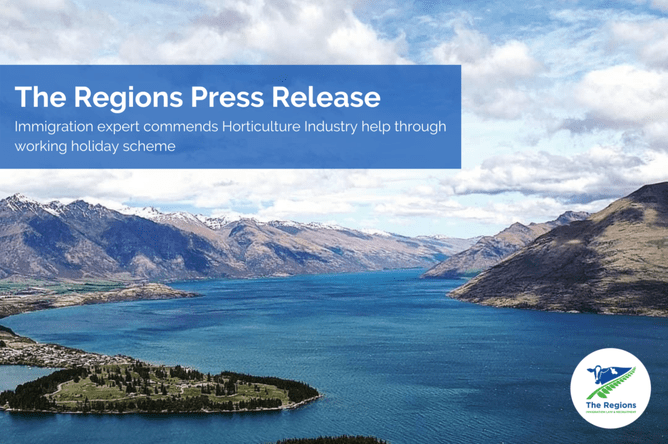Seeks comparable action for calving 2021 to help farmers with critical labour shortage
- Working holiday visa holders without employer sponsorship can pick fruit with no new visa applications, under recently announced extension
- Queenstown seminar on Thursday 8 October addressing changes & extensions for working holiday visa holders, and the ongoing shortage of skilled labour in dairy farming industry
- The Regions working with agriculture sector to help fill the labour gap on New Zealand dairy farms
Immigration expert, Ben De’Ath states the horticulture industry will appreciate the help of the policy tweaks that allow working holiday visa holders to fill the critical labour shortage on New Zealand orchards and vineyards, and will address these changes at a seminar in Queenstown this week.
The recently announced extension to the Working Holiday Visa (WHV) by Immigration Minister Kris Faafoi, is welcome news for the horticulture and viticulture industries in the lead up to their busy season, but immigration expert, Ben De’Ath says dairy farms around the country could benefit too – particularly as many have gone through calving chronically short staffed in dairy’s busy season this year – ‘meat and milk are still our biggest export commodity by a considerable margin’ De’ Ath says, and reminds the new Immigration minister to remember this in relation to Covid borders for calving 2021.
De’Ath, founder of The Regions Immigration Law and Recruitment, who is hosting a seminar in Queenstown this Thursday 8 October, says the COVID-19 pandemic and the closure of New Zealand’s borders has accentuated the labour shortage on dairy farms, but working holiday visa holders, who are physically fit and have a passion for the outdoors, could find viable employment in the agriculture sector if they are not in stable jobs now, and are not interested in picking fruit – farming offers a long term, well paid stable career, with NZ farmers willing to train all comers.
“The WHV extension will greatly benefit seasonal roles which need filling, but we still have hundreds of dairy farming jobs across New Zealand. Anyone with an expiring working holiday visa, not wishing to work in horticulture or viticulture can remain in New Zealand in other jobs providing they meet the standard Essential Skills Visa requirements.
“We are working with a number of working visa holders to transition them onto an Employer Assisted Work Visa, which they’re eligible for if they can be guaranteed at least 30 hours per week,” De’Ath says. “New Zealand farmers are crying out for farmworkers who can join their staff and provide labour for any length of time.”
On Thursday evening, De’Ath will address the impact of New Zealand’s closed borders on the agricultural industry’s recruitment needs. “Dairy farmers rely on farmworkers with skilled visas, but we are facing an extended period of time without newly arriving hardworking and dependable employees – this needs to be considered well before calving next year – in the same way it is now considered for our horticulture colleagues.”
De’Ath will also discuss wage-based temporary visas, the recently revoked stand down policy, retention for employer and employee security, and mandatory accreditation at Thursday’s seminar to be held at the Queenstown Memorial Centre, 7pm.
Admission is free.
FOR MORE INFORMATION
E: patricia@theregions.co.nz
P: 0800 100 274
The Regions Immigration Seminars
Queenstown
Date: Thursday, 8 October
Time: 7pm
Address: Queenstown Memorial Centre – 1 Memorial Street,
Winton
Date: Wednesday, 14 October
Time: 7pm
Address: The Salvation Army Building, 7 Dejoux Rd, Winton
Gore
Date: Thursday, 15 October
Time: 7pm
Address: Heartland Hotel Croyden, 100 Waimea St, 9776 – The Trust Room
About The Regions
The Regions is an immigration law company that supports New Zealand dairy farm owners and migrants to New Zealand. By providing a holistic immigration, recruitment and settling-in service, The Regions works to better the lives of migrants seeking a new life in New Zealand and provides employment solutions to the agricultural industry.
To date, The Regions has placed over 1700 work visa holders on 700 dairy farms across New Zealand. The 30-person company provides immigration, recruitment and ongoing pastoral care and support to new migrants and New Zealand dairy farmers.
